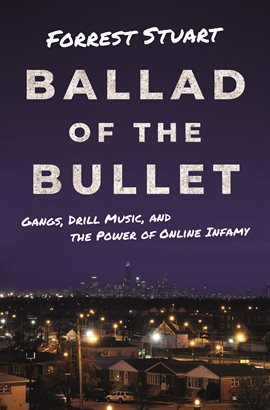
eBook
hoopla Instant
Ballad of the Bullet
Year
2020
Language
ENGLISH
Publication Information
Princeton University Press
Summary
"Forrest Stuart, Winner of a MacArthur fellowship, John D. and Catherine T. MacArthur Foundation" "Winner of the CITAMS Book Award, Communication, Information Technologies, and Media Sociology Section of the American Sociological Association" "Honorable Mention for the Outstanding Book Award, Inequality, Poverty and Mobility Section of the American Sociological Association" "Finalist for the PROSE Award in Cultural Anthropology & Sociology, Association of American Publishers" Forrest Stuart is associate professor of sociology and director of the Ethnography Lab at Stanford University. A 2020 MacArthur Fellow, Stuart is the author of Down, Out, and Under Arrest. Twitter @ForrestDStuart How poor urban youth in Chicago use social media to profit from portrayals of gang violence, and the questions this raises about poverty, opportunities, and public voyeurism Amid increasing hardship and limited employment options, poor urban youth are developing creative online strategies to make ends meet. Using such social media platforms as YouTube, Twitter, and Instagram, they're capitalizing on the public's fascination with the ghetto and gang violence. But with what consequences? Ballad of the Bullet follows the Corner Boys, a group of thirty or so young men on Chicago's South Side who have hitched their dreams of success to the creation of "drill music" (slang for "shooting music"). Drillers disseminate this competitive genre of hyperviolent, hyperlocal, DIY-style gangsta rap digitally, hoping to amass millions of clicks, views, and followers-and a ticket out of poverty. But in this perverse system of benefits, where online popularity can convert into offline rewards, the risks can be too great. Drawing on extensive fieldwork and countless interviews compiled from daily, close interactions with the Corner Boys, as well as time spent with their families, friends, music producers, and followers, Forrest Stuart looks at the lives and motivations of these young men. Stuart examines why drillers choose to embrace rather than distance themselves from negative stereotypes, using the web to assert their supposed superior criminality over rival gangs. While these virtual displays of ghetto authenticity-the saturation of social media with images of guns, drugs, and urban warfare-can lead to online notoriety and actual resources, including cash, housing, guns, sex, and, for a select few, upward mobility, drillers frequently end up behind bars, seriously injured, or dead. Raising questions about online celebrity, public voyeurism, and the commodification of the ghetto, Ballad of the Bullet offers a singular look at what happens when the digital economy and urban poverty collide. "The global cross-pollination of drill music is not a coincidence. Young people suffering from inequality and violence are harnessing social media to be heard and valued. Ballad of the Bullet is a detailed, sensitive toolkit for understanding cultural production in the modern city; essential reading for educators, community workers and music fans alike."---Ciaran Thapar, youth worker and writer, speaking on BBC Radio "Mr Stuart's recent book, Ballad of the Bullet, is an often gripping account of what he learned from his association with teenage members of an up-and-coming drill group-he dubs them the Corner Boys-desperate to win fame, status and money from rapping. He shows how their musical and lyrical talent is only a minor part of what determines success."---Adam Roberts, The Economist "The book completely reshaped the way I thought about micro-celebrity and youth culture, and it opened my eyes to how discussions of the internet have been largely oblivious to the worlds of those who are not class-privileged, white and female. As people have been sucked ever deeper into their digital worlds in 2020, Stuart shines a light on how social media offer both hope and danger for some of our cities' most disadvantaged young."---Ashley Mears, Time